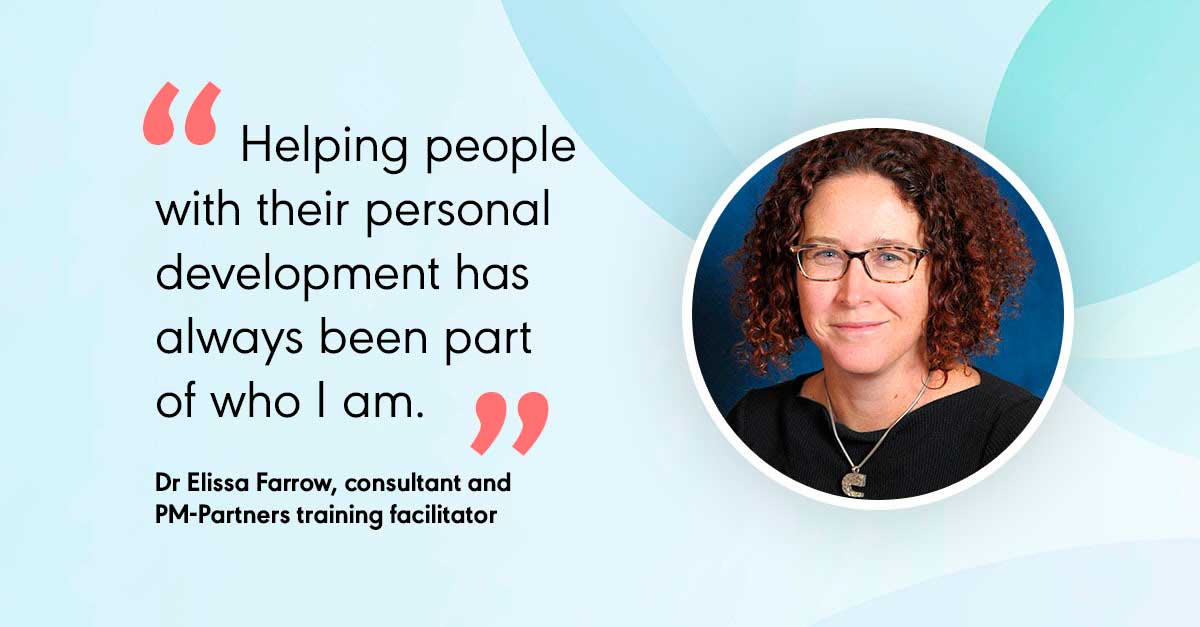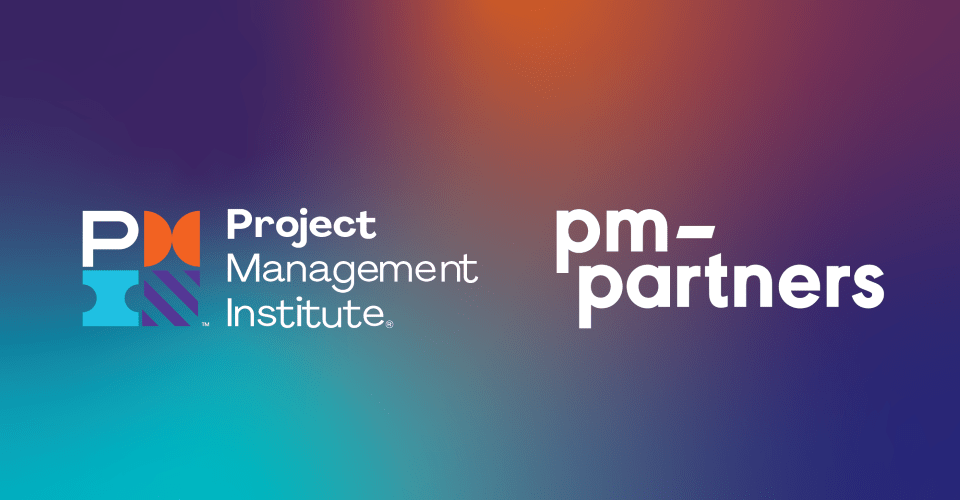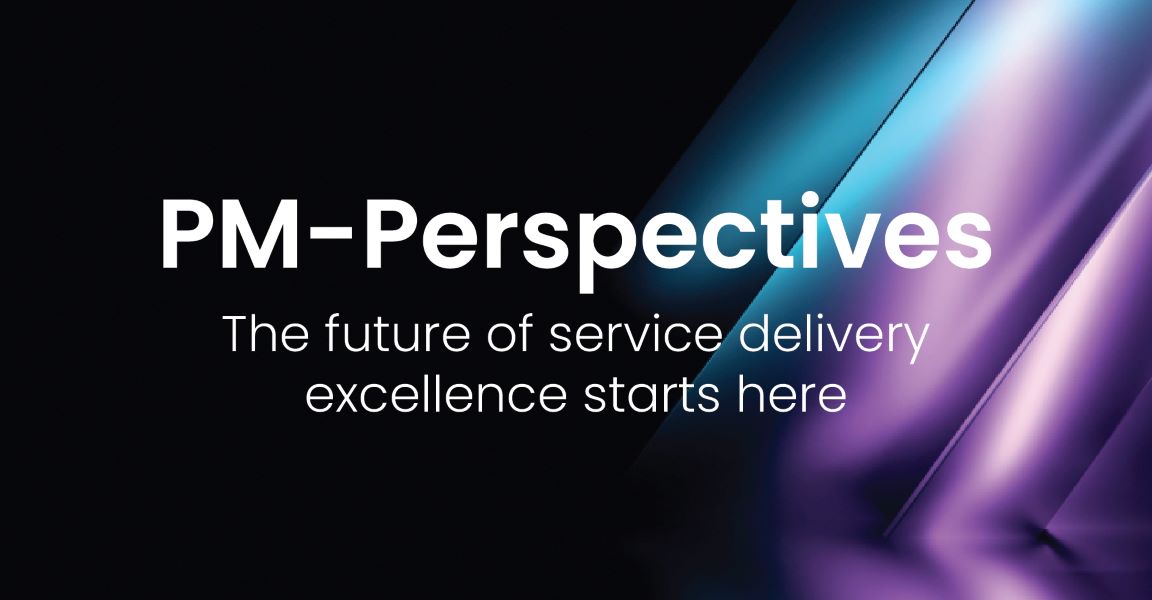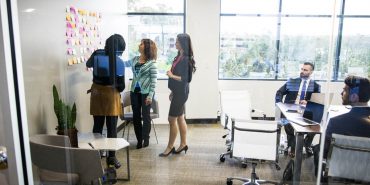Dr Elissa Farrow: A journey of continuous improvement

Like her training facilitator colleagues at PM-Partners, Dr Elissa Farrow treads a continuous pathway of learning and experience. Here she shares her latest accomplishment and how her approach to personal development informs her work.
Coming from all backgrounds, sectors and areas of expertise, PM-Partners’ training facilitators are a pretty diverse bunch. But they do have a few things in common. They’re all experts in their field with a wealth of hands-on practice – and, in many cases, they have the battle scars to prove it. This means they can draw from real-life scenarios and offer a rich learning experience for our trainees. Further, they all practice what they preach when it comes to professional development – a growth mindset is a big part of their M.O.
Dr Elissa Farrow, a PM-Partners training facilitator of some eight years, is no exception – in fact she’s recently taken the concept of growth to an even more impressive level, acquiring her Doctor of Philosophy degree. She talks to us about what inspires her to keep learning, her journey to receiving her doctorate and how all this feeds back into her facilitation work with PM-Partners.
Firstly, in your role as a PM-Partners trainer, what are your areas of specialty and have you trained many people from within the organisation?
I’ve trained people like Grant Bridger, PM-Partners Director of Advisory, and a number of other training facilitators, consultants and sales staff. Courses I teach include Managing Successful Programmes (MSP®), Management of Portfolios (MOP®), Portfolio, Project and Programme Offices (P3O®), Change Management, Managing Benefits™ and PRINCE2 Agile®. I’m also AgileSHIFT® credentialed as well.
Training facilitation is just one of the dimensions to your work – what are the other focus area?
I’m a consultant, researcher and strategy formulator – I enable businesses to deliver transformations successfully. I’m also often asked to mentor and coach senior leaders in relation to how they personally need to strategise for and adapt to complex change.
I’ve been proud to receive commendations for my work over the years including a national award for my contribution to women in project management from the Project Management Institute. I’ve also won a number of awards for my research from the Association of Professional Futurists and the Change Management Institute.
Given all your areas of expertise, what are you most passionate about and is there a common thread running through your work?
I‘m a futurist and organisational adaptation specialist but my background is as a social scientist. I originally worked in the community sector in domestic and family violence prevention activities before moving into government, often in a human services context. Since then, I’ve loved working with a diverse range of organisations and people to help define and enact strategy in a way that keeps people at the heart of the process and encourages considerations about our ecosystem and community, rather than just viewing organisational decision making through an economic lens. This was a strong theme in my doctorate research as well.
Embarking on a PhD is quite a commitment – please tell us a bit about your research and what prompted you to pursue this path?
It was four-year journey that involved studying alongside my consulting and facilitation work and it’s an experience I’m very proud of myself for undertaking.
My research examined the implications of artificial intelligence on organisations of the future – how they need to adapt and the role and views of leaders and teams in that journey. I’d had it on my mind to do a doctorate since finishing my master’s degree in the 90s and I had a situation with a client that highlighted what can happen when people respond poorly to change. This change wasn’t super complex but it did involve people letting go of old ways of doing things. It got me thinking ‘well, what about when robots or AI take a greater share of human jobs?’ This is complex change – it’s deeply layered and connected to deeper views around humans being central to the concept of work – I knew I’d found something that I could really sink myself into.
I set all of my research 20 years in the future (2040 context) and had 140 people in various cities and countries to consider the implications of five operating models of organisations in the future, and the influence of mindset on their adaptability. It was fun to stretch people’s boundaries and because my research was set in the future, people were able to almost embody some of the thoughts and feelings via role play, ranging from the optimistic to pessimistic view.
What do you hope will come from your research in terms how it might shift people’s thinking and prepare us for this change that’s coming?
I think AI presents us with some incredible opportunities. My research did reveal the need for organisations and decision makers to broaden their prioritisation criteria. In particular, I’d love to see a commitment around ethical safeguards and making sure that people – whether they’re staff, customers or community members – have the ability to choose their mode of service in the future. We need to ensure that there’s no discrimination or inequity that emerges due to essentially switching from a human process to one that’s done by forms of technology.
I think there are real challenges for leaders in that – they certainly have to embrace more of a futures mindset and shift their own ability and capacity to adapt – that’s something that I’ll be turning my attention to now that I’ve graduated.
So how does all this experience feed back into your work as a training facilitator?
I bring that same approach around helping people adapt and broaden their thinking to my training facilitation work. Helping people with their personal development has always been part of who I am – from my first job as a volunteer supporting disadvantaged young people to my first role after my undergrad degree at uni I was working to improve the lives of people and helping them to grow their skills and their belief in their abilities. And a lot of my work is about facilitating relationships and facilitating growth.
I think my doctorate has also crystallised some messaging that I’ve always had but I’ll be more deliberate about now in my facilitation and consultancy work. Encouraging people to broaden their exploration of today’s answers by listening to a diverse range of voices and check the ethical consequences of decisions today on the future. That’s what I encourage in my PM-Partners students, not to restrict themselves to the text and task today, but instead to think about application, tailoring and scaling concepts; to think beyond today into the future.








